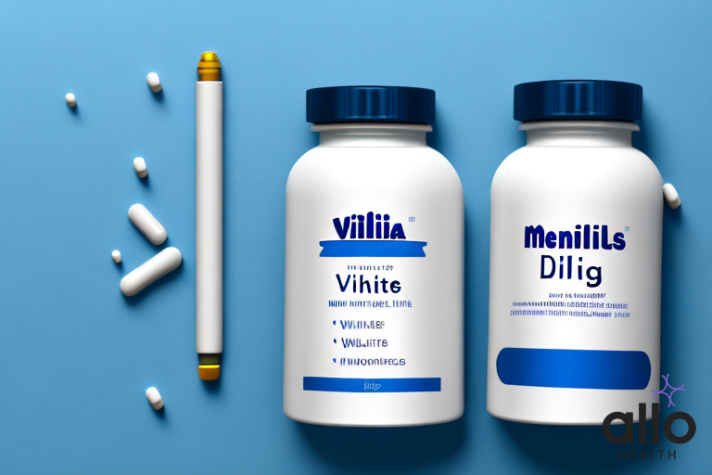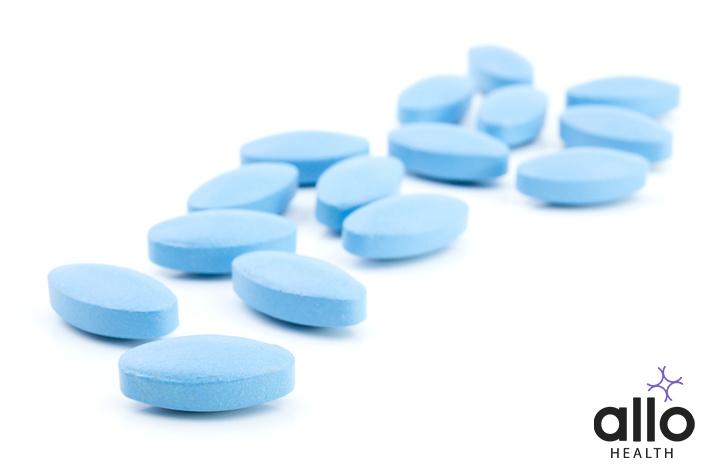Comparing Cialis vs Viagra: Which Is the Better Option?

Allo Health is dedicated to personalized well-being, offering support and trusted information tailored to individual health goals. The platform emphasizes human-generated content, led by a distinguished medical team of experts, including physicians and sexual health specialists. Their commitment to credibility involves rigorous fact-checking, authoritative research, and continuous updates to ensure accurate, up-to-date information. Allo Health's unique approach goes beyond conventional platforms, providing expert-led insights and a continuous commitment to excellence, with user feedback playing a crucial role in shaping the platform's authoritative voice.

Dr. Aditi completed her undergraduate medical education at AJIMS, Mangalore, after which she worked in multi-speciality hospitals with COVID patients and in the Pain and Palliative medicine department. Driven by her experiences, she developed a keen interest in psychiatry. Dr. Aditi believes that mental health is just as, if not more important, than physical health.
Why This Was Upated?
Our experts continually monitor the health and wellness space, and we update our articles when new information became available.
Updated on 20 June, 2024
- Article was updated as part of our commitment to diversity, equity, and inclusion.

"The following blog article provides information about a drug or brand name drug and its potential effects or benefits. However, it is crucial to understand that this information is intended for general educational purposes only and should not be considered a substitute for professional medical consultation. It is highly recommended to consult with a qualified healthcare professional before making any decisions regarding medication, treatment, or healthcare management.
Book consultation
Individuals have unique medical conditions, and the information provided in this article may not be applicable to everyone. Only a qualified healthcare provider can evaluate your specific medical situation, taking into account your medical history, conducting appropriate tests, and providing personalized advice and recommendations. They are equipped to make informed decisions tailored to your individual needs.
It is crucial to emphasize that self-diagnosis, self-medication, or disregarding medical advice can have serious health consequences. This article may reference specific brand names or drugs for illustrative purposes. Mention of these names does not imply endorsement, recommendation, or guarantee of their efficacy or safety. The choice of medication should be based on discussions and individualized guidance from a healthcare professional who has a comprehensive understanding of your medical condition.
"Erectile dysfunction is a common concern affecting men all over the world. Medications like Viagra and Cialis are two of the most common erectile dysfunction treatment. In this article, we look at the similarities and differences between these two prescription drugs to help you decide what’s best for you.
What is Cialis?
Cialis, a widely used medication, belongs to the class of phosphodiesterase type 5 (PDE5) inhibitors.
The active ingredient in Cialis is tadalafil.
It is prescribed to treat erectile dysfunction by increasing blood flow to the penis during sexual stimulation. This drug is known for its longer duration of action compared to similar medications, offering up to 36 hours of potential effectiveness.
Potential Side Effects
Common Side Effects:
- Headache
- Heartburn and indigestion
- Nausea and diarrhea
- Cough
- Muscle pain
- Drop in blood pressure
- Flushing
Emergency Side Effects (Seek immediate medical attention if experienced):
- Erection lasting longer than four hours (Priapism)
- Sudden vision changes, including blurred vision
- Sudden hearing changes, including ringing in the ears
- Dizziness
- Chest pain
- Hives, rash, or blistering
- Difficulty breathing or swallowing
- Swelling of the face or mouth
If any of these emergency side effects occur, it is crucial to consult with a healthcare provider promptly.

What is Viagra?
Viagra, a well-known medication, is a phosphodiesterase type 5 (PDE5) inhibitor commonly prescribed for treating erectile dysfunction.
The active ingredient in Viagra is sildenafil.
By enhancing blood flow to the penis during sexual stimulation, Viagra helps facilitate and maintain erections. It’s renowned for its rapid onset of action, typically taking effect within 30 minutes to an hour after consumption.
Potential Side Effects
Common Side Effects:
- Headache
- Heartburn
- Diarrhea
- Flushing
- Nosebleed
- Sleep troubles
- Numbness, burning, or tingling in the arm, hands, and feet
- Muscle aches
- Changes to vision, including sensitivity to light, seeing a blue tinge, or difficulty distinguishing between blue and green.
Serious Side Effects (Seek immediate medical attention if experienced):
- Loss of vision or blurred vision
- Changes to hearing or ringing in the ears
- Dizziness and lightheadedness
- Fainting
- Chest pain
- Shortness of breath
- Erection lasting longer than four hours or is painful
- Itching or burning while urinating
- Rash
If any of these serious side effects occur, it’s essential to contact a healthcare provider promptly.
Cialis Vs Viagra: A Comparison
The main difference between Cialis and Viagra is their active ingredient and duration of effectiveness. The active ingredient in Cialis is tadalafil while in Viagra it is sildenafil citrate.
While Viagra typically provides an effect for about 4-6 hours, Cialis has a longer duration of action, lasting up to 36 hours. This distinction allows individuals to choose a medication based on their preference for spontaneity or planned activities.
| Feature | Cialis | Viagra |
|---|---|---|
| Drug Class | PDE5 Inhibitor | PDE5 Inhibitor |
| Onset of Action | Slower onset, 30 minutes to 2 hours | Rapid onset, typically within 30 minutes |
| Duration of Effect | Up to 36 hours | About 4-6 hours |
| Recommended Dosage | Usually taken as needed, lower daily dose for continuous use | Typically taken as needed, higher dose |
| Food Interaction | Can be taken with or without food | Best taken on an empty stomach for faster absorption |
| Effectiveness | Long duration of action, suitable for planned activities | Rapid onset, ideal for spontaneous encounters |
| Common Side Effects | Headache, indigestion, back pain | Headache, flushing, upset stomach |
| Alcohol Interaction | Moderate alcohol consumption is generally acceptable | Best to avoid excessive alcohol intake |
How Do Erectile Dysfunction Medications Work?
Erectile dysfunction (ED) medications like Cialis and Viagra operate by targeting the enzyme phosphodiesterase type 5 (PDE5), a crucial player in the regulation of blood flow. When a man is sexually stimulated, nitric oxide is released in the erectile tissue of the penis. Nitric oxide then activates an enzyme called guanylate cyclase, leading to an increase in levels of cyclic guanosine monophosphate (cGMP).
- Muscle Relaxation: The increased levels of cGMP cause the smooth muscles in the penile arteries to relax.
- Blood Flow Enhancement: This relaxation of muscles allows for increased blood flow to the penis by relaxing blood vessels, filling the erectile tissues, and resulting in an erection.
- PDE5 Inhibition: Now, enter PDE5. Its role is to break down cGMP and regulate the blood flow post-sexual stimulation.
ED medications intervene by inhibiting PDE5. By doing so, they prolong the presence of cGMP, maintaining the relaxation of the penile muscles and promoting sustained blood flow for harder erections. This process helps men with erectile dysfunction achieve and sustain erections during sexual activity.
Cialis Vs Viagra: Which One Lasts Longer?
When comparing Cialis and Viagra, one notable difference lies in the duration of their effects. Cialis is renowned for its longer duration, providing effectiveness for up to 36 hours. This extended window of opportunity has earned it the nickname “the weekend pill.” In contrast, Viagra typically lasts about 4 to 6 hours.
So, if you’re seeking a medication that allows for a more extended timeframe of spontaneity and sexual activity, Cialis might be the preferable choice. However, individual preferences and specific needs should guide the decision, and consulting with a healthcare professional is crucial to determine the most suitable option based on one’s health and lifestyle.

Cialis Vs Viagra: Which One Works Faster?
In terms of onset of action, Viagra tends to work faster than Cialis. Viagra typically takes effect within 30 minutes to an hour after consumption, making it a suitable option for spontaneous sexual encounters.
On the other hand, Cialis has a slower onset, usually taking effect within 30 minutes to 2 hours. However, its advantage lies in its extended duration of action, providing effectiveness for up to 36 hours.
So, if a quicker response is a priority, Viagra might be the more suitable choice.
Cialis Vs Viagra: Which One is More Effective?
Cialis and Viagra exhibit equal effectiveness.
Effectiveness can also be influenced by individual response, underlying health conditions, and lifestyle preferences.
It’s important to note, though, that the effectiveness of Viagra may be diminished when taken with food, especially high-fat meals.
Cialis Vs Viagra: Which One is Cheaper?
The price of Cialis and Viagra can vary based on factors such as dosage, quantity, and where the medications are purchased. Additionally, generic forms of these drugs may be available, offering a more cost-effective option.
Dosage Instructions
Dosage instructions for Cialis and Viagra should be followed as prescribed by a healthcare professional, and individual needs may vary. It’s crucial to consult with a doctor before starting any medication. Below are general guidelines:
Cialis Dosage Instructions:
- On-Demand Use: The typical starting dose is 10 mg, taken at least 30 minutes before anticipated sexual activity.
- Daily Use: For those intending to engage in sexual activity more than twice a week, a lower dose of 2.5 mg or 5 mg daily may be recommended.
- Adjustments: Dosage adjustments may be made based on individual response and tolerability, but self-adjustment is not advisable.
Viagra Dosage Instructions:
- On-Demand Use: The standard starting dose is 50 mg, taken approximately 30 minutes to 60 minutes before sex. The dose can be adjusted based on effectiveness and tolerability.
- Maximum Frequency: Viagra is generally taken as needed, but not more than once daily.
- Food Interaction: It’s recommended to take Viagra on an empty stomach for faster absorption, as high-fat meals can delay its onset of action.
- Adjustments: Dosage adjustments may be made by a healthcare professional based on individual response and tolerability.
It’s essential to strictly adhere to the prescribed dosage and never self-adjust without consulting a health care professional. If there are concerns or questions about the dosage, a doctor should be consulted for guidance.
Drug Interactions
Cialis (Tadalafil) and Viagra (Sildenafil) Interactions:
- Nitrates: Concurrent use with nitrates is contraindicated for both medications due to the risk of a significant drop in blood pressure.
- Alpha-Blockers: Caution is advised when using either Cialis or Viagra with alpha-blockers, as both can lower blood pressure. The dosage of either medication may need adjustment.
- Antihypertensive Medications: Both Cialis and Viagra can enhance the hypotensive effects of antihypertensive drugs, potentially leading to a significant drop in blood pressure.
- CYP3A4 Inhibitors: Medications that inhibit the CYP3A4 enzyme, such as ketoconazole and ritonavir, can increase the concentration of both Cialis and Viagra in the blood. Dosage adjustments may be necessary.
It’s essential to inform your healthcare provider about all the medications you are taking, including prescription medications, over-the-counter drugs, and herbal supplements, to ensure the safe use of these medications and to discuss potential interactions.
Safety and Precautions
- Medical Consultation: Always consult with a healthcare provider before starting Cialis or Viagra to ensure they are safe for your specific health conditions.
- Medication Interactions: Inform your healthcare provider about all medications you are currently taking, including prescription and over-the-counter drugs, as well as herbal supplements.
- Nitrates: Avoid concurrent use of Cialis or Viagra with nitrates, as it can lead to a dangerous drop in blood pressure.
- Cardiovascular Issues: Exercise caution if you have a history of cardiovascular problems, and inform your doctor of any heart conditions or related issues.
- PDE5 Inhibitor Allergy: If allergic to PDE5 inhibitors, refrain from using Cialis or Viagra.
- Priapism Awareness: Be aware of the signs of priapism (prolonged and painful erections lasting more than four hours) and seek immediate medical attention if it occurs.
- Vision and Hearing Changes: Report any sudden vision or hearing changes to your healthcare provider promptly.
Key Takeaways
- Erectile dysfunction is a global concern, with medications like Viagra and Cialis being common treatments.
- Cialis, a PDE5 inhibitor, enhances blood flow to the penis, known for its prolonged 36-hour effectiveness.
- Common adverse effects of both medications include headache, flushing, and muscle pain.
- Emergency side effects, such as prolonged erection or vision changes, require immediate medical attention.
- Viagra, another PDE5 inhibitor, is recognised for its rapid onset, typically within 30 minutes.
- The main difference is that Cialis lasts up to 36 hours, making it suitable for planned activities, while Viagra lasts about 4-6 hours, ideal for spontaneity.
- Both medications operate by inhibiting PDE5, prolonging the presence of cGMP to facilitate and sustain erections.
- Dosage instructions vary, and adherence to prescribed dosages is crucial.
- Both medications have similar drug interactions and precautions, involving nitrates, alpha-blockers, and CYP3A4 inhibitors.
- Prior medical consultation is necessary, and individuals should promptly report any unusual side effects or changes to their healthcare provider.
Frequently Asked Questions
Q: What are the symptoms of Erectile Dysfunction?
A: Symptoms of Erectile Dysfunction (ED) include difficulty achieving or maintaining an erection, reduced sexual desire, and concerns with ejaculation.
Q: Can Cialis help treat enlarged prostate?
A: Cialis may be prescribed for treatment of benign prostate hyperplasia (BPH), however, medical guidance from a health care professional is required before consumption.
Q: Can people with heart disease take Cialis/Viagra?
A: Patients with heart disease or history of heart attacks should consult their healthcare provider before using Cialis or Viagra, as these medications can interact with nitrates and potentially lead to a dangerous drop in blood pressure.
Q: Can testosterone levels cause ED?
A: Yes, low testosterone levels can contribute to erectile dysfunction by affecting libido and the ability to achieve and sustain an erection. Consulting a healthcare professional is advisable for proper evaluation and management.
Q: Can Cialis/Viagra be taken for premature ejaculation?
A: Cialis and Viagra are not specifically indicated for treating premature ejaculation. While they may have some impact on ejaculation timing, their primary function is to enhance erectile function, and other treatments are more targeted for premature ejaculation. Consulting with a healthcare provider is recommended for personalised advice on treatment options for premature ejaculation.






































